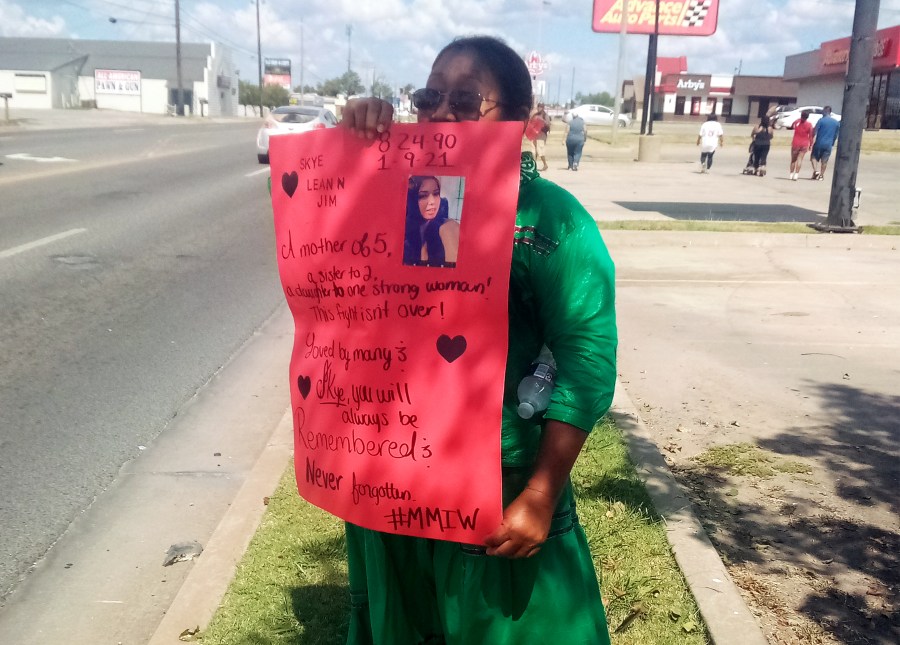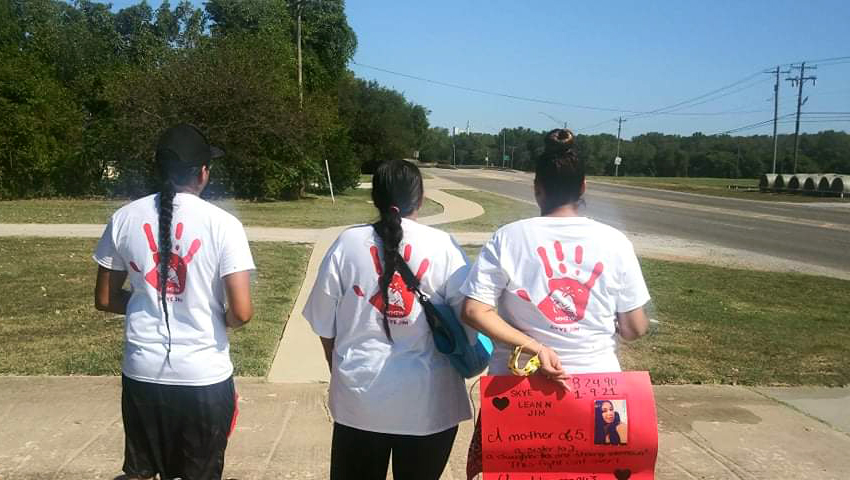(NewsNation) — In 2006, absentee Shawnee Tribe member Alecia Onzahwah wiped tears of relief as Oklahoma officers said her missing 15-year-old daughter, Skye Jim, had been found safe.
Fifteen years later, Onzahwah once again opened her door to find officers bearing news of her daughter. This time, it was devastating: She’d been found dead by the side of a road.
Immediately, Onzahwah thought the circumstances were suspicious and spent the next year fruitlessly trying to prove it to police.
“As a parent, as a mother, it felt like I was dead, too,” Onzahwah said. “I’m a ghost, and I’m trying to scream to the world and the nation to hear my daughter’s story, to acknowledge her personhood, to acknowledge her humanity and nobody hears me.”
Nationwide, a disproportionately high number of Indigenous people are murdered and it is the third-leading cause of death for Native women. Four out of five Indigenous people have experienced violence, according to a report by the National Institute of Justice.
Compounding the problem is incomplete data: Nearly half of all homicides of Native people committed from 1999 to 2017 went unreported to the FBI, a study revealed. There is no reliable count of how many Native women go missing or are killed each year.


At the heart of the issue is a snarled web of confusing, sometimes-conflicting federal and tribal laws and hazy jurisdictional divisions resulting in failed or sometimes nonexistent communication between agencies.
The result? People like Onzahwah are left shuffling between agencies for years, searching for information about the investigations into their missing and killed loved ones.
“There’s just generations of historical obstacles that we have to overcome,” said Dawn Pullin, a Washington State Patrol tribal liaison. “It’s a big task and it’s a big job.”
A federal bill passed in 2019 was supposed to take the first steps toward addressing these issues by creating an advisory committee to recommend ways state, tribal and federal law enforcement could work together.
But a February 2021 deadline to make appointments came and went with little official movement. The Department of Justice said changes in White House administration and agency leadership interfered with its ability to meet deadlines.
‘They just want to be found’
From the day last January when Onzahwah learned of her daughter’s death, she was single-minded in her mission to help police investigate. She later felt those efforts were futile.
“It’ll never go away,” Onzahwah said. “I am not the same person that I was. I never will be. It’s been difficult and I think it’s compounded by … having to investigate her case myself.”
Police told Onzahwaha a person called 911 to report that they’d hit Jim with their car. Local news reports at the time said she had been lying in the road. Jim was pronounced dead at the scene.
Onzahwah provided officers with documents and text messages from her daughter’s phone to help with the investigation, but the mother said she didn’t feel taken seriously. Phone calls to investigators went unanswered and jurisdictional limitations prevented other agencies from looking into the case. Onzahwah described an officer she interacted with as being “really, really, really dismissive.”

Deborah Shipman, who heads Missing and Murdered Indigenous Women USA, a group that helps Native families navigate the justice system, said it’s common for them to be overlooked and unheard.
“Most of the time, (law enforcement doesn’t) take it seriously at all,” she said. “We as adults should be saving them, not ignoring them or going, ‘Oh, they’re a runaway, they did it to themselves.’ I call BS on that.”
NewsNation filed an open records request in late April with Oklahoma Highway Patrol for information about Jim’s case. A department spokesperson said Jim’s case was closed but the agency has not yet provided details about how that conclusion was reached.
Beyond pushing the investigation, Onzahwah was determined not to allow Jim’s memory to be obscured by a statistic.
A mother of five, Onzahwah says Jim was shy, empathetic and fiercely funny.
‘I think her compassion extended even further than I had realized … because after her death, different people were reaching out — people that we didn’t even know that she had made friends with over the years — and telling us how she had impacted their lives,” Onzahwah said.
I’m not the same person that I was. I never will be.
Alecia Onzahwah
Across the country, fear of the worst spurred another mother — Washington State Rep. Debra Lekanoff — into action. She sponsored, and lawmakers greenlit, a bill to create a first-of-its-kind, statewide alert system to help identify and locate missing Indigenous people.
“I just know from being a mom that (to) have the entire state of Washington looking for my daughter with me — imagine that feeling,” said Lekanoff, a Tlingit and Aleut woman who co-sponsored the bill.
Washington state has a sizable Indigenous population and more than four times as many Native women than white women go missing there each year.
Proponents of the alert system say it will make the distinction that a missing person is Indigenous, similar to the Amber Alert for children and Silver Alert for senior citizens. It could also allow the state to overcome jurisdictional issues, foster better communication and build trust, they say.
“(A missing girl) is not going to recognize what badge finds them. Which party, which jurisdiction,” Lakanoff said. “These women who are gone missing … they just want to be found.”

